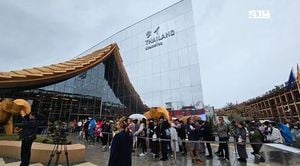In a significant diplomatic effort, Iran and the United States have commenced the second round of talks regarding Tehran's nuclear program in Rome. This round, which began on April 19, 2025, is being mediated by Oman and involves key figures from both nations. Steve Witkoff, the U.S. envoy, and Abbas Araghchi, Iran’s foreign minister, lead their respective delegations, with the discussions taking place at the Omani ambassador's residence in the Italian capital.
The talks kicked off shortly before noon local time, as reported by various media outlets, including Axios and Iranian state television. Araghchi arrived first at the venue, followed by Witkoff's motorcade approximately 30 minutes later. Omani Foreign Minister Badr Al-Busaidi is playing a crucial role as the chief mediator in these discussions.
This round of negotiations follows a week of preliminary talks held in Oman, which both sides described as constructive. During those discussions, Iran indicated its willingness to accept certain restrictions on uranium enrichment. However, Tehran has stipulated that it requires solid guarantees that U.S. President Donald Trump will not abandon the nuclear deal again, a concern that looms large over the current negotiations.
The backdrop of these talks is marked by the ongoing tension surrounding Iran's nuclear ambitions and the potential for military action by the U.S. should diplomatic efforts falter. President Trump has previously threatened to unleash military force if negotiations do not yield results, adding urgency to the current discussions.
In a statement made in Moscow just a day before the talks commenced, Araghchi expressed optimism about reaching an agreement with the U.S. on Iran's nuclear program. He emphasized that such an agreement is attainable if Washington approaches the negotiations with a realistic mindset.
Historically, the two nations have not engaged in direct negotiations since 2015, during the administration of former President Barack Obama. The current indirect talks illustrate a cautious approach, with both sides communicating through Omani officials who are shuttling messages back and forth.
As the diplomatic process unfolds, the international community watches closely. The stakes are high, not just for Iran and the U.S., but for global security and non-proliferation efforts. The outcome of these talks could have far-reaching implications, potentially reshaping the geopolitical landscape in the Middle East.
In summary, the ongoing negotiations in Rome represent a critical juncture in U.S.-Iran relations, with both sides navigating a complex web of historical grievances, strategic interests, and the pressing need for a diplomatic resolution to the nuclear issue.





